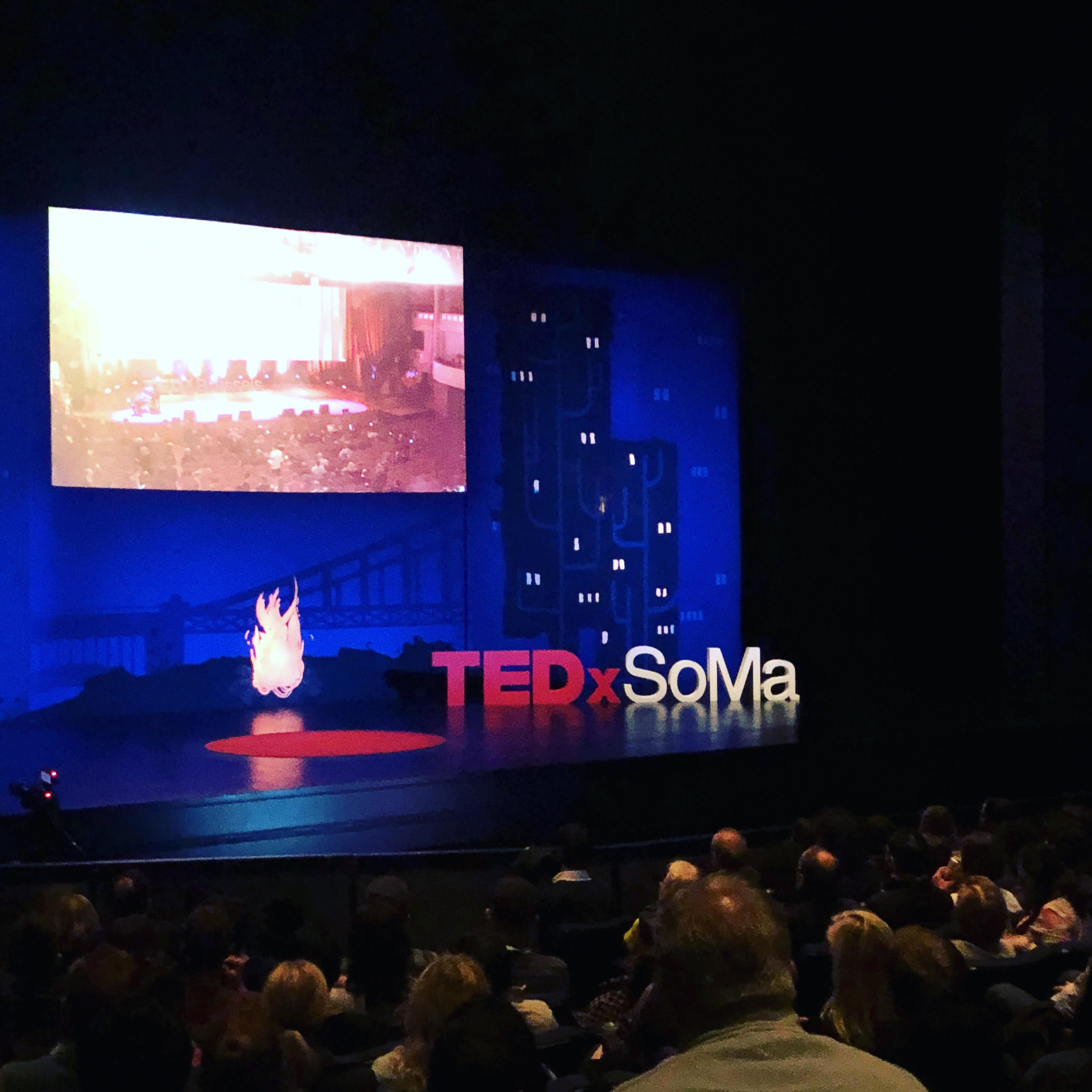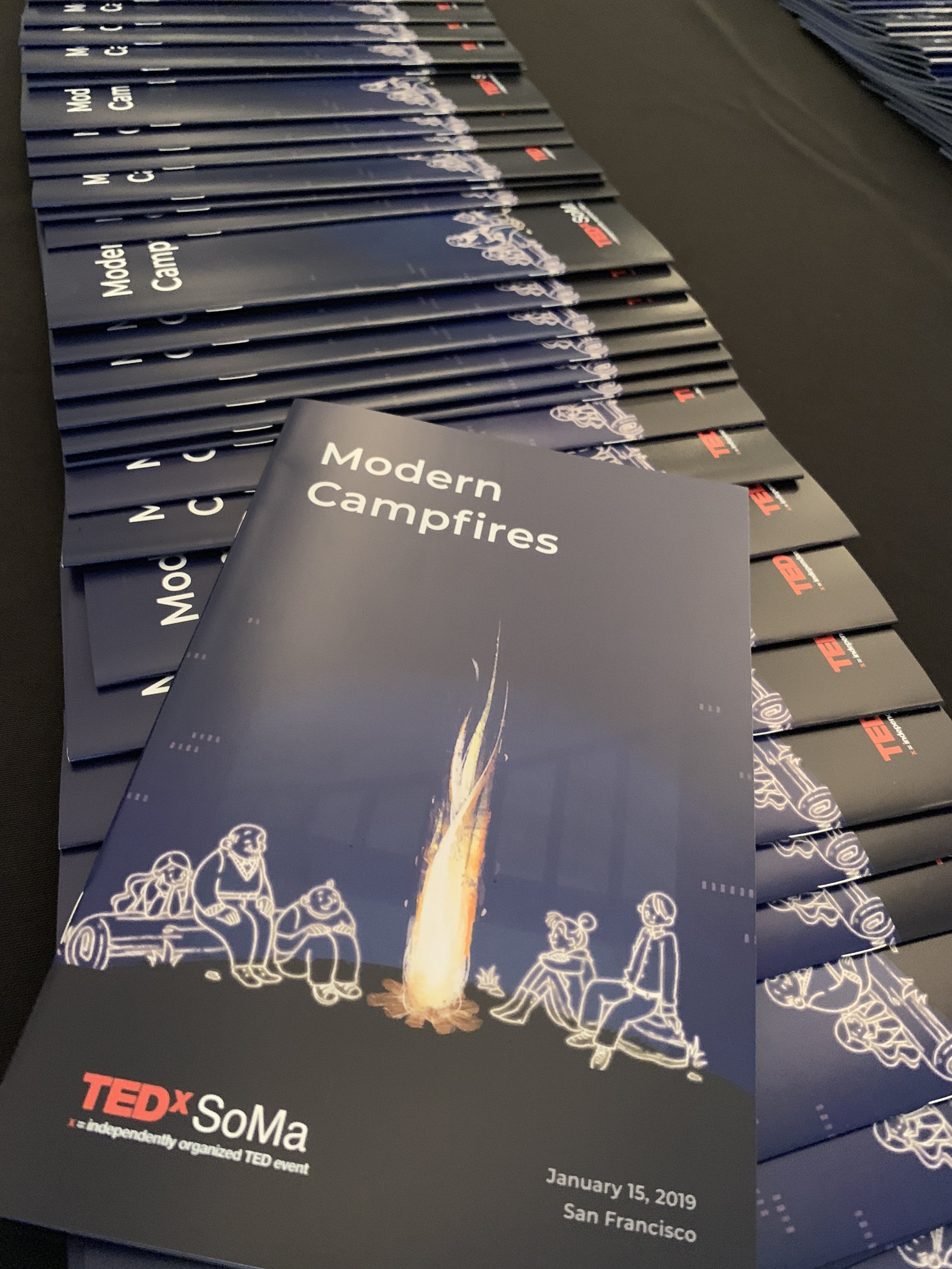In her recent TED Connects discussion on “How to be your best self in times of crisis,” Harvard Medical School psychologist Susan David shares how to build resilience, courage and joy in the midst of the coronavirus pandemic. We challenge you to practice these steps as you work remotely or tackle any new projects!
Gathering Around Modern Campfires at TEDxSoMa
There’s nothing like sitting around a campfire sharing stories and creating conversation—but is it possible to recreate this warm and whimsical experience in a tech-obsessed city like San Francisco on a Tuesday night? TEDxSoMa thought so.
On January 15, about 700 attendees braved rainy weather to gather in the Yerba Buena Center for the Arts to receive inspiration from six hand-selected speakers, each with an idea worth spreading. The TEDx event theme? Modern Campfires. The TEDxSoMa website creatively elaborated on this theme of choice sharing, “The campfire has been a place for people to come together - a place to tell stories, learn from each other, and gain a sense of belonging and community.”
A handful of us from the cred team had the pleasure of volunteering at TEDxSoMa. We loved interacting with other San Franciscans passionate about attending a “modern campfire” to create community and connection.
Ideas Worth Spreading
After months of coaching and training, six speakers took the TEDx stage for a night of modern campfire conversation. Here’s a recap of TEDxSoMa’s 2019 speakers:
Juliana Delgado, an award-winning Colombian writer, spoke about the language hierarchy in the United States and how it limits a group’s access to opportunities and social acceptance.
“...staying up late to practice pronouncing words so the kids at school wouldn't make fun of me. I hated myself for not fitting in, not realizing that there was a hierarchy much bigger than me at play here. I felt I was the one who was wrong.”
Mazin Jamal, founder and director of Holistic Underground, spoke about masculinity in today's culture and how to redefine what it means to "be a man."
“When I was hopeless, I was useless to everyone, and I was making things worse. And that’s what happens, men feel useless and hopeless so they double down on the problem. And everyone pays the price-especially women and transgender people.”
fnnch, an artist who believes art is for everyone, spoke about how street art is art for the masses. He shared the importance of looking for canvases everywhere, taking back public spaces, and investigating your town's local regulations around public art.
“Public space is our space...our way to communicate with each other. To express ourselves. To be heard. To listen. To inspire each other. To comfort each other....And you do not need to be a professional artist to join in….”
Chief Sylvia Moir, a California native who serves as the Chief of Police in Tempe, Arizona, spoke about mindfulness.
“There was plenty of Resistance. To some it meant that by encouraging the practice of mindfulness, I was softening policing. The science and research suggested that building resilience to trauma and toxicity was hard work, and changing culture and climate is tough.“
Dr. Yoni Alkan, a professional cuddler, sexual educator, and consultant, spoke about the power of platonic touch.
“Rejection feels so searing to us, that we try to avoid hearing ‘No’ at all costs and stop asking. Rejection is hard, but I’d much rather have an honest ‘NO’ than a ‘YES’ you don’t mean.”
Bishop William Swing, the former Bishop of San Francisco and current President and Founding Trustee of United Religions Initiative (URI), spoke about unity within community.
“I thought: ‘If the world has a United Nations, then most likely the world needs a United Religions. Someone should do something about that. Why not me?’ The question captured my heart.”
Besides the original content coming straight from the lips of these six speakers, the audience enjoyed an intermission filled with a meditation session and dance performance from Vancouver dance troupe TWObigsteps Collective. The dance titled “Veils” was influenced by W.E.B. Dubois' theory of “double consciousness.”
Takeaways
The original and carefully crafted TED talks from these speakers did not fall on deaf ears. There was a full house and the audience was extremely excited to be there. One cred team volunteer even took a photo for a man in front of the stage who he said that being there was "a dream come true."
While the speakers and topics were diverse, TEDxSoMa 2019 had the resounding theme of mindfulness as the common thread–the consistent theme about reframing how we think about our everyday lives.
Speaking 101: Lessons Learned in Public Speaking
"Your mission in any presentation is to inform, educate, and inspire. You can only inspire when you give people a new way of looking at the world in which they live.”
- Robert Ballard, discoverer of Titanic (1985)
---
Hosted by some of the brightest innovators and professionals around the world, today’s TED talks have become the gold standard in public speaking. It’s no surprise then that TED (which stands for technology, entertainment, and design) and TED-style events are exploding everywhere.
Rather than being envious of these individuals’ awesome presentation skills (it’s hard not to be—we know), what can we learn from them to make ourselves better, more engaging public speakers?
We’ve pulled the top three lessons by former news anchor and keynote speaker Carmine Gallo in his article 9 Public Speaking Lessons From The World's Greatest TED Talks. Keep these in mind as you plan your next presentation!
First, tell a story. The human brain loves the storytelling style. We’ve been telling stories for generations, long before the invention of writing. Many anthropologists say that stories are central to human existence, serving as recognizable patterns in which we find meaning. So instead of bombarding your audience with statistics and figures, make your presentation more personal.
Second, teach your audience something they didn’t already know. According to research, there is a region of our midbrain, called the substantia nigra/ventral segmental area (SN/VTA), that can only be activated with absolutely novel stimuli. In layman’s terms, we are hardwired to love novelty.
Third, know your purpose, and tap into the right emotions. One way to grab your audience’s attention is by delivering jaw-dropping moments that trigger certain emotions. As Gallo mentions, speakers should try to elicit joy, fear, shock, or surprise in order to have a stronger effect on the listener - it’ll help them remember your presentation long after it’s over.
When asked what they thought was the most important lesson regarding public speaking, a few team members at cred PR shared their insights:
“You never know who is going to be in the audience!” - Caitlin
“Even if you’re not confident, pretend that you are. Fake it till you make it!” - Stephanie B.
“Push each other. Execs and moderators get nervous when discussing controversial issues and lean on “safe topics.” It’s important to push each other out of their comfort zone.” - Laura
“Everyone has a good story to tell. The key is to find the right audience!” - Leah
---
What do you think is the most important thing to know about public speaking? Share your thoughts in the comments section below!
Need help finding your audience? That’s our specialty!











